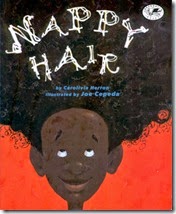

" had what she considered to be viable death threats against her," says Noliwe Rooks, author of Hair Raising: Beauty, Culture and the African American Woman. The debate resulted in a firestorm of calls to have Sherman fired. One of the parents was not pleased, according to an investigation launched by New York City's Department of Education, because of the belief that the phrase "nappy hair" was a racial slur. In 1998, white New York City schoolteacher Ruth Sherman received tremendous backlash after assigning Nappy Hair, a book by Carolivia Herron focused on cultivating positive feelings about nappy hair in young children. Your purchase helps support NPR programming. Those negative associations have endured for centuries.Ĭlose overlay Buy Featured Book Title Nappy Hair Author Carolivia Herron and Joe Cepeda "And that included the skin color, their build, their height, and it especially included their hair." " was based on the phenotype," said Torres-Saillant. He says the focus on hair began as Europeans tried to rationalize their dominance and superiority. Hair texture was one of the many rationalizations of the perceived subhuman status of the African, according to Silvio Torres-Saillant, a professor of humanities at Syracuse University. (There's also a largely discredited theory out there that the term comes from the British use of nappy to describe a diaper, or someone dirty or unruly.) There is a lot of speculation that nap was redefined as a disparaging phrase for the coils and kinks in the hair of the African enslaved, in connection with the fields of cotton that drove the Colonial economy. The likely origin of the term is the word nap, which was used to describe the frizzled threads raising from a piece of fabric.

Nappy's history is tangled up in the arrival of the first slave ships on the coastlines of the Americas in the 17th century. Turns out, the origins of the term are complex. National Hair Style Discrimination Banned In NYC So some questions rose in my head: Where does the term nappy come from and why does it have such negative connotations? Is it possible to reclaim a word that has been used as a slur for so long?

The translation the barber chose for nappy was malo the two terms were synonymously used to describe the hair texture of millions of people of African descent.

The translation of English words into other languages often unveils some interesting layers of meaning. But in English, the barber doesn't tell the man his hair is bad (malo). "Este muchacho tiene pelo malo," one of the barbers says to the others, shaking his head. There's usually a hum of hair clippers buzzing through the loud bachata music in the shop, but the moment the man walks through the heavy glass door, a silence seems to befall the place. A black man walks into my barber shop on Manhattan's Lower East Side and removes his hat, revealing hair that is thick and tightly coiled.


 0 kommentar(er)
0 kommentar(er)
